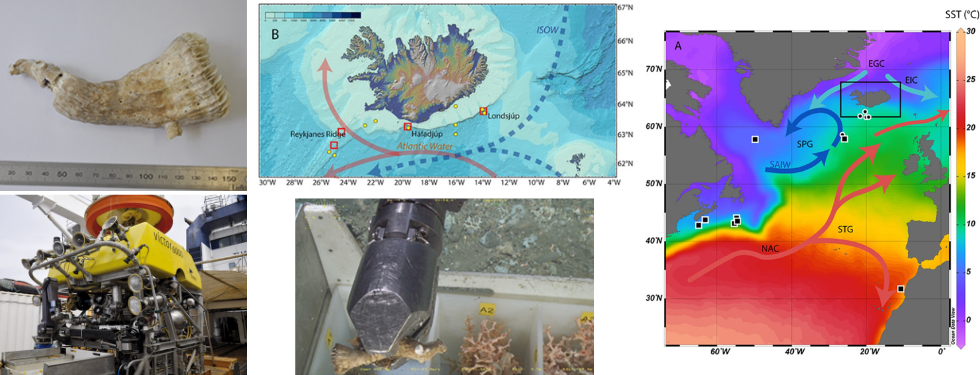Recent environmental changes in the North Atlantic revealed by cold-water coral geochemistry and implications for the Arctic warming


Title: Recent environmental changes in the North Atlantic revealed by cold-water coral geochemistry and implications for the Arctic warming (ICE-CORALS)
Scientific Person in Charge: Manuel Rigo | Programme: PRIN 2022 DM 104/2022
The ICE-CORALS project aims to address some of the fundamental knowledge gaps of the decadal and centennial variability in the northward transport of warm subtropical waters to the Arctic region, and expand our mechanistic understanding of the link between the northward ocean heat transport (OHT), the Atlantic meridional overturning circulation (AMOC) and Subpolar Gyre (SPG) dynamics. In particular, the project will provide robust and precisely-dated records of the mid-depth hydrography at decadal to centennial timescale for the last ca. 500-600 years, including seawater temperature, full carbonate chemistry, nutrient content and water mass circulation and ventilation, using the geochemistry of cold-water corals (CWC) and outputs from numerical modelling. ICE-CORALS project will apply a fully integrated, innovative approach that exploits a unique collection of CWC from the Northern Iceland Basin and a highly complementary suite of geochemical and modelling tools. The coral samples, which were retrieved by a remotely operated vehicle (ROV) at intermediate depths (500-700 m) during the cruise ICECTD, will be analysed for trace elements, stable and radiogenic isotopes. Coral-based results will be compared to outputs from available historical simulations of state-of-the-art climate models. The outcomes of ICE-CORALS will provide an unprecedented opportunity to investigate the long-term trends and variations of key physico-chemical parameters in the recent past beyond the limited instrumental records and constrain the pre-industrial ocean-climate interactions in the North Atlantic at decadal timescale. ICE-CORALS is on the cutting-edge of global climate change research and its goals are in line with the EU's policy on the Arctic within Cluster 5 of the Horizon Europe programme. The project has also a strong link with the coral-based related research activities and international projects developed by the French, German and Australian colleagues, with whom the ICE-CORALS proponents collaborate since many years. Finally, the proposed research is exceptionally cost-effective, especially considering the enormous expense of a research vessel and ROV operations required to collect these very difficult to access, hence rare samples.





